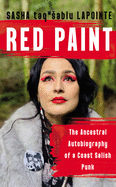
In Red Paint: The Ancestral Autobiography of a Coast Salish Punk, Sasha taqʷšəblu LaPointe delivers a cutting, artful thrashing of settler colonialism and a sensitive exploration of ways of healing and forging space for community and connection through storytelling. LaPointe, a poet and songwriter from the Nooksack and Upper Skagit Indian tribes, recounts a coming of age abundant with love as well as instability, punk rock, skepticism and, at times, trauma. Via written word and grounded journeys, she honors ancestors who have modeled ways to heal, love, preserve stories and language and leave legacies. Their names reverberate throughout: Comptia Koholowish, Aunt Susie and Vi taqʷšəblu Hilbert.
LaPointe's intimate prose is introspective, raging and funny. Vivid details mark salient memories of falling in love, navigating conflict and asserting value. She wrestles with the desire to honor the bravery of those before her and anger at people and institutions that relentlessly demand it. LaPointe writes: "I hate the word 'brave.' Like I hate 'victim,' 'survivor,' or 'squaw.' " Instead, she writes, "call me Coast Salish or poet. Call me a girl who loves Nick Cave, and night swimming, and ramen, and old Bikini Kill records. I no longer wish to be called resilient." Indeed, reducing Red Paint to a story of resilience does a disservice to LaPointe's nuanced offering: meditations on self and legacy, thoughts on the urgency of listening and representation, and a model for creating space to connect across communities inherited and created.
And night swimming. And ramen. And records that are old, new and unforgettable, much like LaPointe's words. --Katie Weed, freelance writer and reviewer

